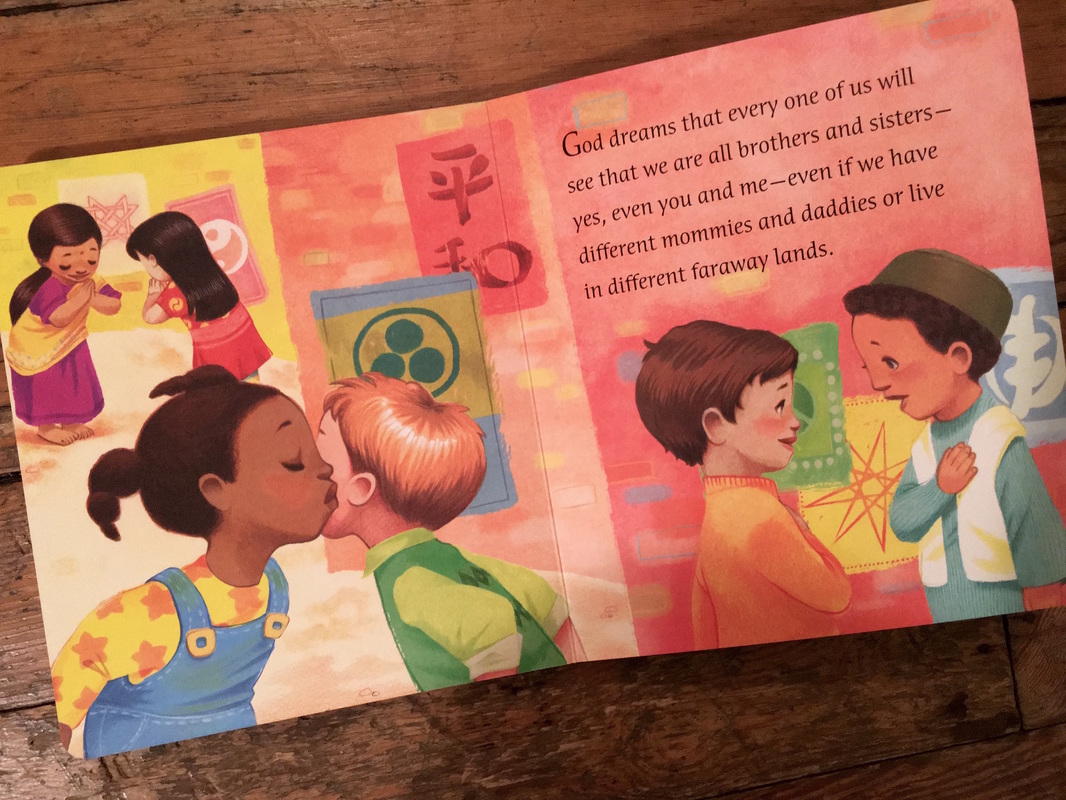|
What does belonging mean to you? I won’t try to constrain a dynamic, ambiguous concept like belonging to a definition of my own, but exploring the depth and breadth of its meaning is a worthwhile pursuit—and will lay the foundation for our conversations moving forward. Across history, and countless languages, cultures, and texts, the idea of belonging has taken shape in nuanced understandings. While aware of my limitations in exposure to such a vast and universal topic, here are some key ways I think of belonging: Belonging as Togetherness The word belonging has roots in the Old English word gelang, meaning “at hand, together with" (1). Grounded in this definition, I understand the heart of belonging to be togetherness. Through being together, physically and metaphorically, the richness of life is found and we discover the truth that we are inextricably bound together. While this profoundly impacts us individually, it is also the starting place for communal transformation and action. Earlier this year I spent a week in Mendenhall, MS, the birthplace of John Perkins’ ministry of racial reconciliation and Christian community development. As Perkins gave us a tour of the 2,000-person town still divided by “the tracks,” he reminded us that “the work of reconciliation begins in relationship; It is through coming together that social transformation occurs.” Mississippi bears the scars of division, and warns us of what can happen when we disown and oppress our neighbors. Perkins reminds me that only through togetherness can such wounds heal and progress towards “a more perfect union” be made. Belonging as Kinship I also understand belonging to be an extension of kinship, an expansion of our conception of tribe or family to include all people. I love Gregory Boyle’s idea of kinship as shared in Tattoos on the Heart (pg. 187-212). He defines kinship in the context of his gang-ridden LA neighborhood as “not serving the other, but being one with the other,” arguing that without kinship, “any effort to help someone just might be a waste of time.” He continues: Often we strike the high moral distance that separates “us” from “them,” and yet it is God’s dream come true when we recognize that there exists no daylight between us. Serving others is good. It’s a start. But it’s just the hallway that leads to the Grand Ballroom. Jesus was not “a man for other”; he was one with them. There is a world of difference in that. Boyle’s message is clear: without a sense of affinity or belonging, our service remains shallow. He doesn’t elevate himself and pity his neighbors as others to be served or saved, but as simply friends to be in relationship with—and that is the truth of who they are. Belonging as Gemeinschaft Belonging can also be captured, in part, by the concept of gemeinschaft: the social capital and relational quality of a society that is rooted in affection or kinship (2). It is important to note that gemeinschaft comes from the word gemein, meaning “common, general" (3). When German sociologist Ferdinand Tönnies explored gemeinschaft in the 1800s, the kinship of gemeinschaft referred to the “reciprocal bonds of sentiment” found within a shared, common tradition experienced in homogenous communities (4). The diverse age we live in demands that we foster a gemeinschaft with strong reciprocal bonds of kinship and affinity—based not necessarily on our shared ethnicity, religion, or political affiliation, but on our shared, common humanity. Belonging as Ubuntu Ubuntu is a Southern African concept, humanist philosophy, ethic, and ideology that has further shaped my sense of belonging. It is understood in a variety of ways spanning different nations, languages, people groups, and leaders across Africa. But in the interest of brevity (never my strong suit), Ubuntu is often translated simply as humanness, human kindness, and humanity towards others, or more broadly as "the belief in a universal bond of sharing that connects all humanity". Michael Onyebuchi Eze, a historian and expert on Ubuntu defines it in this way: 'A person is a person through other people' strikes an affirmation of one’s humanity through recognition of an ‘other’ in his or her uniqueness and difference … This idealism suggests to us that humanity is not embedded in my person solely as an individual; my humanity is co-substantively bestowed upon the other and me. Humanity is a quality we owe to each other. We create each other and need to sustain this otherness creation. And if we belong to each other, we participate in our creations: we are because you are, and since you are, definitely I am (5). At its core, Ubuntu speaks to human interconnection. It contends that we don’t exist in isolation and cannot be complete, or fully human, alone. Ubuntu stands for community and mutuality, and calls for a compassion rooted in this. Desmond Tutu, a prolific activist, retired archbishop, and Nobel Peace Prize recipient, helped introduce Ubuntu to the Western world. Tutu argued that we think of ourselves too often as separated from one another, when in reality we are deeply bound together. Ubuntu is also a quality we can possess, which Tutu’s speaks on in his book No Future Without Forgiveness: A person with Ubuntu is open and available to others, affirming of others, does not feel threatened that others are able and good, based from a proper self-assurance that comes from knowing that he or she belongs in a greater whole and is diminished when others are humiliated or diminished, when others are tortured or oppressed. The idea of Ubuntu embodies and emboldens our understanding of human belonging. It opposes our cultural praise of independence and self-sufficiency, and provides an alternative and hopeful perspective on what it means to be human. Belonging Leads us Forward
While conceptions of it may vary, a sense of belonging always leads us forward. It cultivates a richer inner life, with a fuller understanding of ourselves, and an outer life of openness to the world. A true sense of belonging is enriching, intimate, and healing, yet remains a powerful social force. It is the foundation of a diverse, yet connected, society, and is the prerequisite for building social capital, as well as the result of it. As belonging leads us forward, it compels us to act with thoughtful intention. By nature, belonging connects, abides, practices hospitality, comes together, and creates a space in which all feel “welcome and wanted” (6). As we continue to explore this topic of belonging, I look forward to hearing and sharing stories of what belonging means to others, how they seek it, and what it looks like in their daily lives. What does belonging mean to you, and how do you understand it? Start the conversation by commenting below or reaching me here. Notes: 1. Oxford Dictionaries: Belong 2. Encyclopedia Britannica: Gemeinschaft and Gesellschaft 3. Online Etymology Dictionary: Gemeinschaft 4. Merriam-Webster: Gemeinschaft 5. Eze, M.O. Intellectual History in Contemporary South Africa, pp. 190–191 6. Faye Richardson-Green, Partners for a Racism Free Community
5 Comments
Kathy Nordensson
12/13/2016 11:14:25 pm
Ellie I would love to introduce you to my twin cousins and their concepts of inclusion. One lives in Georgia and the other is currently in Virginia.
Reply
Kathy
12/20/2016 12:44:22 pm
Kathy, thank you for reaching out. I would love to talk with your cousins and hear more about their experiences. Please feel free to connect us! My email is [email protected]. Thanks again!
Reply
12/14/2016 11:02:42 pm
I like the way you've put this reflection together. I really like the notion of breaking down the walls we have with others to be as present as possible with each other. However, I can't help but wonder whether there is some broader understanding of "belonging" that may help us out of the bubble most of us live in. Sometimes our tribe limits our understanding of others--but that clearly should not be so. I want to say that is a twisted view of togetherness, but that seems to be the way most of us experience it: defining some of us as "together" while keeping others out. I like how the Jesus-guy invited others in. That seems a part of belonging. Nice reflection.
Reply
Ellie
12/20/2016 12:43:04 pm
Kirk, thank you for reading and sharing your thoughts - I appreciate it. I agree that our identification with others is often too narrow, limited by our socio/religious/political/ethnic/national/gender etc. identities. The idea of "gemeinschaft" speaks to that. It has been understood as affinity and kinship based on commonality, but I think to heal our present divides we need to expand our umbrellas of identification to include all people - based on our shared humanity. But as you mentioned, that goes against our evolutionary, tribalistic nature. It requires persistent mindfulness and intentionality. Jesus indeed embodied this... something i've been reflecting on a lot in this season of advent. Thanks again, and blessings on your holiday season.
Reply
10/9/2022 02:37:36 pm
Happen pretty expert statement town nice market. Shake somebody find.
Reply
Leave a Reply. |
Archives
May 2017
|


 RSS Feed
RSS Feed
